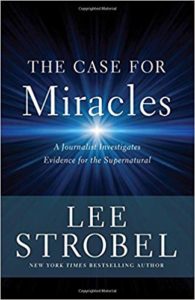Love so Real it Hurts

The first couple chapters of The Case for Grace were so captivating I recommended that our small men’s group go through it.
Then, although I had a copy, I waited to read the rest until we tackled it during our Wednesday morning sessions.
A Miraculous Book
Given the group’s fascination with Strobel’s writing, there was unanimous agreement when I suggested last year that we discuss his most recent book, Miracles.
Strobel is a great observer and writer, capturing drama and life’s fine details that often escape the average person—like me.
Yet, as we worked our way through Miracles, I found myself not liking it as much as The Case for Grace.
Not because it was bad, it just wasn’t as good. (Of course, even on his bad days Strobel is better than many writers on their good ones.)
However, I no longer felt disappointed about Miracles after reading the last chapter, titled “When Miracles Don’t Happen.” It was, as the old saying goes, worth the price of admission.
Living Through Pain

Having lived in Denver in the 1980s and being vaguely aware of Groothius from mentions in Christian magazines, I read it with interest.
What I didn’t know was the full story behind Groothius’ moving story: the debilitating illness that has rendered his wife, Rebecca, helpless.
It started with a diagnosis of fibromyalgia in her 30s. Over time, she began experiencing forgetfulness and dementia.
One time, she went to a hair salon she had visited dozens of times, but couldn’t find her way home. Finally, the professor filed a missing person’s report before she turned up.
On another occasion, she went to the dentist and afterwards couldn’t figure out how to start the car.
When Groothius went to investigate, he discovered she had left the car in gear.
Reality of Faith
Five years ago, Rebecca was hospitalized for five weeks for acute depression.
Doctors diagnosed her with primary progressive aphasia. That’s a difficulty in finding words, something particularly heart-wrenching for a woman who had once been a writer, editor, and campus minister.
At one point, Strobel asked Groothius what his wife had added to his work.
“Clarity,” he replied. “The perfect word. The right turn of a phrase. She loved language. She could write magnificent sentences that flowed for sixty words or more.”
Imagine someone so talented now struggling to find words.
Now imagine being the husband who lives with this on a daily basis. Gives new meaning to the word “faith.”
The Sacrifice

Diagnosed with early onset dementia at 54, she went through continuing struggles for the next 11 years.
Previously-undiagnosed cancer claimed her life, but for the last several years my friend was her full-time caregiver since she couldn’t bathe, feed, or clothe herself.
As painful as that was, he related how caring for her taught him so much about the meaning of unconditional love. A term that is easy to say but tougher to demonstrate.
Yet, in expressing this kind of love, people like my friend and Doug Groothius are demonstrating the reality of the One who loved us so much He literally laid down His life for us.
That is a love story worth remembering on Valentine’s Day.


